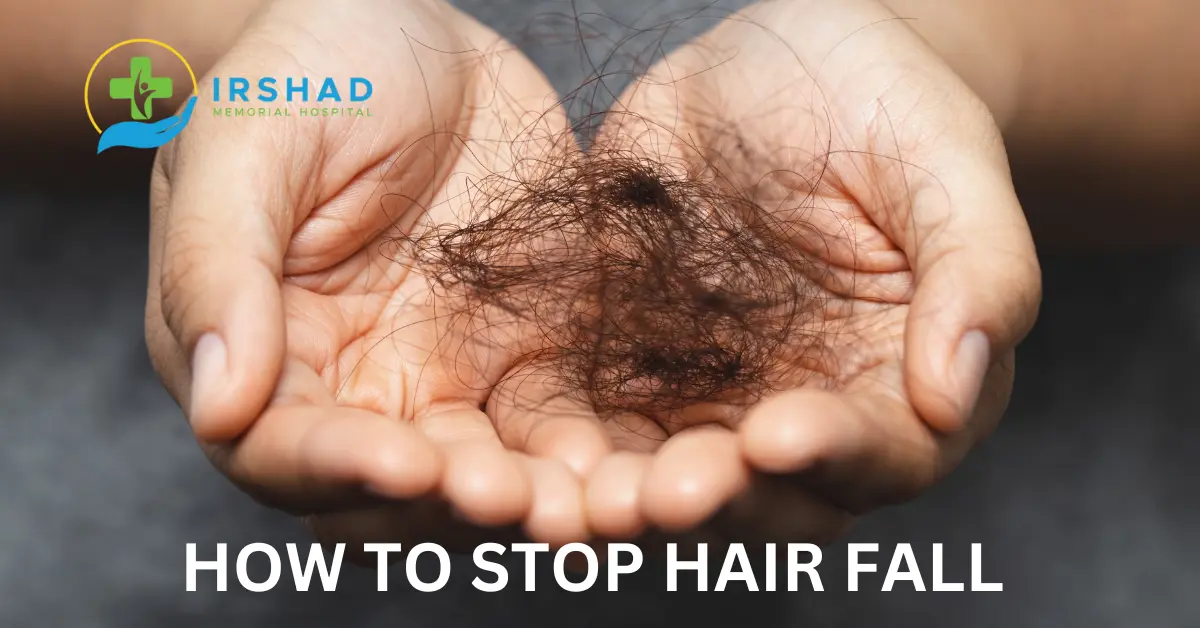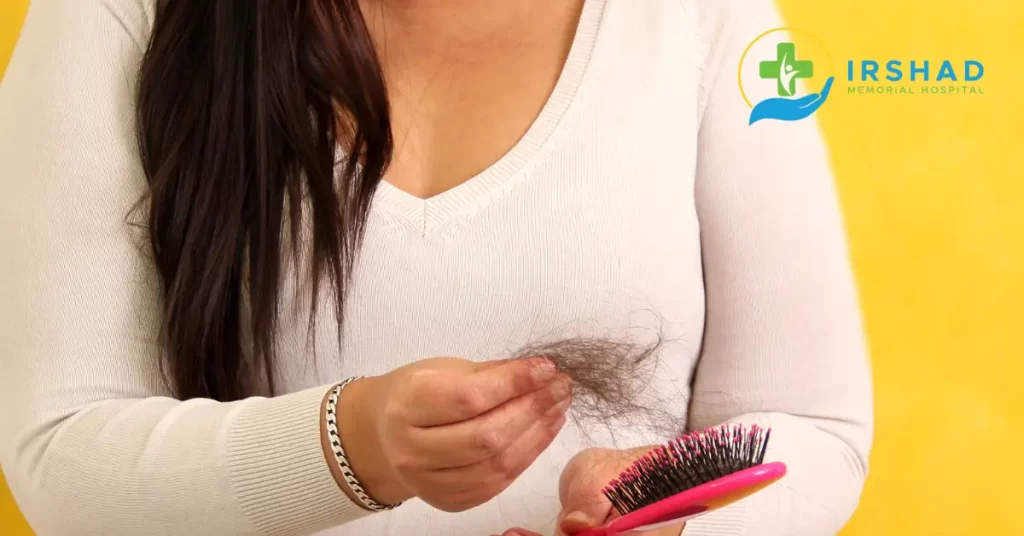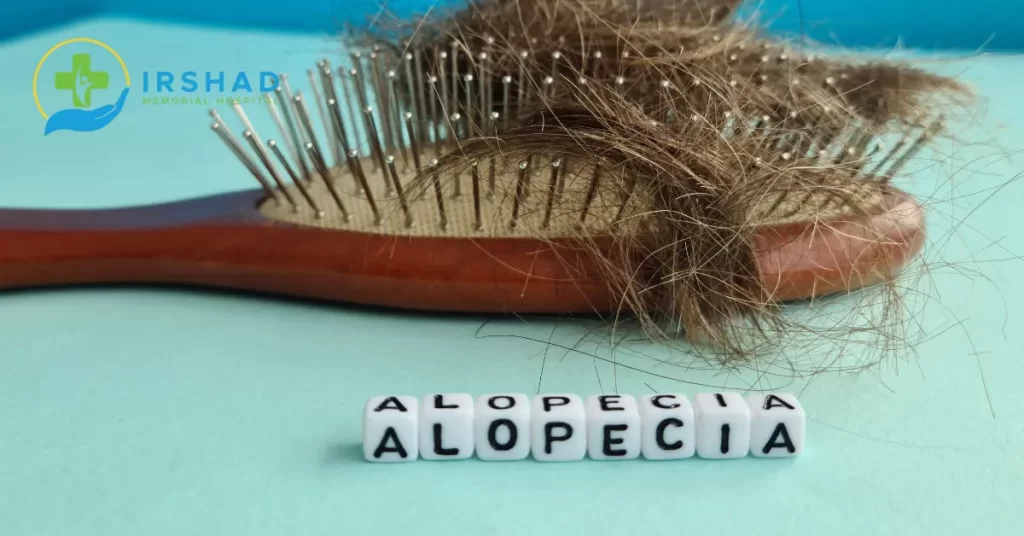
Welcome to our comprehensive guide on “How to Stop Hair Fall.” Dealing with hair loss can be a common concern, and understanding effective strategies to address this issue is crucial for maintaining healthy and vibrant locks. Whether you’re experiencing mild shedding or more significant hair loss, this blog will provide you with practical insights and actionable tips to promote hair health. From dietary adjustments and lifestyle changes to natural remedies and professional advice, we’ll explore a holistic approach to help you curb hair fall and foster a stronger, more resilient mane. Let’s embark on a journey to discover the secrets to healthy and beautiful hair, so you can feel confident and empowered in your quest to prevent and manage hair loss.
How to prevent hair loss and improve hair health
To prevent hair loss and boost hair health, start with a nutritious diet rich in proteins, vitamins, and minerals. Include foods like lean meats, fish, fruits, and vegetables. Stay hydrated and avoid excessive heat styling. Adopt a gentle hair care routine, using mild shampoos and conditioning regularly. Consider regular scalp massages to stimulate blood flow. Protect your hair from pollution and UV rays by covering it when necessary. Manage stress through relaxation techniques like deep breathing and meditation. If applicable, discuss hormonal changes with healthcare professionals. Finally, be patient – healthy hair is a gradual process. By incorporating these simple habits into your lifestyle, you can promote stronger, more resilient hair and reduce the risk of hair loss.
How to prevent hair loss in women

Preventing hair loss in women involves simple yet effective practices. Start by maintaining a balanced diet with ample proteins, vitamins, and minerals. Incorporate foods like eggs, nuts, and leafy greens for essential nutrients. Be gentle with your hair, using mild shampoos and avoiding tight hairstyles. Stay hydrated and protect your hair from excessive heat and sun exposure. Manage stress through activities like yoga or meditation. Regular scalp massages can stimulate blood circulation and promote hair health. If you notice persistent hair loss, consult with healthcare professionals to address potential underlying issues. With a holistic approach that combines a healthy lifestyle, proper hair care, and professional guidance, you can significantly reduce the risk of hair loss and enhance the overall well-being of your hair.
How to prevent hair loss in men
Preventing hair loss in men involves adopting straightforward habits. Start by maintaining a well-balanced diet rich in proteins, vitamins, and minerals to support hair health. Avoid excessive heat styling and harsh hair products, opting for gentle shampoos. Regular scalp massages can enhance blood circulation to the hair follicles. Protect your hair from the sun and pollution. Manage stress through activities like exercise and relaxation techniques. If you notice persistent hair loss, consult with healthcare professionals for personalized advice. Be patient and consistent in your efforts, as healthier hair often results from gradual lifestyle changes. By incorporating these simple practices into your routine, you can promote stronger, more resilient hair and reduce the likelihood of hair loss.
Home remedies for hair loss
Combatting hair loss with simple home remedies is both effective and natural. Massage your scalp regularly with coconut or olive oil to improve blood circulation and nourish hair follicles. Apply a mixture of aloe vera gel and honey, leaving it on for 30 minutes before rinsing, for added hydration and strength. A balanced diet, rich in vitamins and minerals, is crucial; consider incorporating foods like eggs, spinach, and nuts. Rinse your hair with green tea to stimulate growth and reduce hair shedding. Avoid excessive heat styling and tight hairstyles to prevent damage. These easy-to-follow home remedies, coupled with a healthy lifestyle, can contribute to stronger, healthier hair and minimize the risk of hair loss.
How to prevent hair loss after pregnancy
Preventing hair loss after pregnancy involves simple steps to support your hair’s recovery. Ensure a balanced diet with plenty of proteins, vitamins, and minerals to nourish your hair. Be gentle with your hair, using mild shampoos and avoiding excessive heat styling. Consider shorter, low-maintenance hairstyles that reduce stress on your hair. Continue prenatal vitamins or consult with healthcare professionals for postpartum supplements. Manage stress through relaxation techniques like deep breathing and meditation. Regular scalp massages can stimulate blood flow and promote hair health. Be patient, as postpartum hair loss is often temporary and resolves with time. By adopting these gentle practices and prioritizing self-care, you can support your hair’s natural recovery process after pregnancy.
How to prevent hair loss during chemo

Preventing hair loss during chemotherapy involves gentle care and understanding. Consider cutting your hair short before treatment to lessen the emotional impact. Use a mild, sulfate-free shampoo and a soft brush to minimize hair stress. Protect your scalp from the sun with a hat or scarf. Consider a cooling cap during chemotherapy sessions to reduce blood flow to the hair follicles and minimize hair loss. Be patient and kind to yourself, knowing that hair loss is often temporary during treatment. Explore stylish head coverings or wigs to boost confidence. Above all, focus on your health and recovery. Consult with healthcare professionals for personalized advice and support during this challenging time. Remember, your well-being is the priority, and hair can regrow after treatment concludes.
What causes hair loss?
Hair loss can result from various factors, both temporary and long-term. Genetics play a significant role; if it runs in the family, there’s a higher likelihood. Hormonal changes, such as during pregnancy, menopause, or thyroid issues, can contribute. Nutrient deficiencies, particularly in iron, zinc, and vitamin D, may affect hair health. Stress, both physical and emotional, can lead to increased hair shedding. Certain medical conditions and medications, like chemotherapy, also cause hair loss. Poor hair care practices, such as frequent heat styling or tight hairstyles, can damage the hair shaft. Environmental factors, including pollution and sun exposure, may contribute. Identifying the specific cause helps in developing an effective strategy for preventing or managing hair loss. If concerned, seeking advice from healthcare professionals can provide tailored solutions for individual cases.
Can I stop hair loss naturally?
Yes, you can take natural steps to help prevent and manage hair loss. Start by maintaining a balanced diet rich in proteins, vitamins, and minerals to nourish your hair. Avoid excessive heat styling and opt for gentle hair care products. Regular scalp massages stimulate blood flow and promote hair health. Manage stress through relaxation techniques like meditation or yoga. Protect your hair from environmental factors like pollution and sun exposure. Consider natural remedies such as aloe vera or coconut oil for added hydration. While natural approaches can support overall hair health, individual results may vary. If concerned, consult with healthcare professionals for personalized advice tailored to your specific situation. Patience and consistency are key when adopting natural methods to address hair loss.
Can hair loss really be prevented?
While complete prevention of hair loss may not always be possible, adopting certain practices can significantly reduce the risk and promote healthier hair. Maintaining a balanced diet rich in nutrients, gentle hair care routines, and managing stress are key contributors. Avoiding excessive heat styling, protecting hair from environmental factors, and using mild products can also play a role. Identifying and addressing underlying health issues promptly can further mitigate hair loss. However, genetic factors and certain medical conditions may still influence hair health. Consulting with healthcare professionals for personalized advice is crucial. Although complete prevention may not be guaranteed, these proactive measures enhance overall hair well-being, minimizing the likelihood and severity of hair loss.
How do I tell if I’m losing hair?
Detecting hair loss involves paying attention to various signs. Keep an eye on increased hair shedding during daily activities like showering or brushing. Notice if your hair part appears wider than usual or if your ponytail feels thinner. Examine your pillow or shower drain for excessive hair strands. Be aware of changes in the thickness and texture of your hair over time. If you observe a receding hairline or more visible scalp, these could be indicators. Additionally, consult healthcare professionals if you notice sudden or significant hair loss. Monitoring these signs regularly allows you to identify potential issues early and seek appropriate guidance to address any concerns about hair loss.
Consult our skin specialist at Irshad Memorial Hospital

